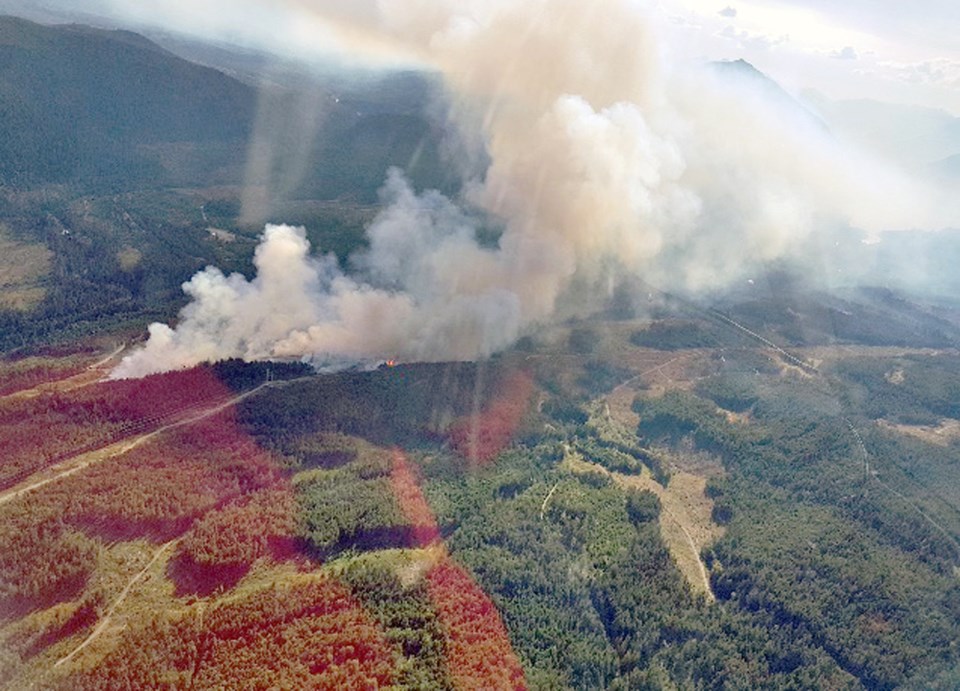Campers in the Nanaimo Lakes area faced a harrowing escape from a wildfire on Monday. Kacy Robinson said campers at two private campsites were removed in the morning due to the growing blaze.
Robinson said she was woken up by campground staff telling her to pack up.
As she and her friends drove onto Nanaimo River Road, they could see fire engulfing trees near the road.
“The fire was already on the road and you could hear it and feel the heat,” Robinson said in an email.
She and her friends pulled over and waited an hour and a half until her husband and the rest of their family drove out in another car. Her husband’s car was stopped as a water bomber dropped its load on the road to make it safe enough for people to leave, Robinson said.
“It was terrifying,” she said.
The Nanaimo Lakes wildfire has grown to 75 hectares and is burning out of control. It is one of dozens of wildfires deemed out of control as hot and dry weather continues to grip much of the province.
The Nanaimo Lakes fire, discovered Sunday, is on Crown land and privately managed forest land. At first, it was about two hectares, but extremely dry and hot weather conditions “preheated the fuel and allowed the fire to burn more easily,” said Natasha Broznitsky, a public information officer for the Coastal Fire Centre.
On Sunday night, crews used heavy equipment to establish control lines and conducted small-scale controlled burns to eliminate fuel between the fire’s edge and the control lines, Broznitsky said. On Monday, 36 fire personnel were battling the flames, and five helicopters and two pieces of heavy equipment were in use.
While smoke wafted across the area, Broznitsky said no nearby communities are threatened and no homes had to be evacuated. “There have not been strong winds on this fire so that’s been helping the crews,” she said.
The fire is the largest on Vancouver Island. It is believed to be human-caused, but the exact reason has not been determined.
The wildfire smoke led the Ministry of Environment to issue a smoky skies bulletin for east Vancouver Island between Nanaimo and Duncan. The smoke left a haze across the Cowichan Valley and the Regional District of Nanaimo.
The bulletin warned that people with health conditions, the elderly, infants and children could be at higher risk of health effects from smoke exposure.
Environment Canada has issued a heat warning for eastern Vancouver Island from Duncan to Campbell River with temperatures up to 32 C expected this week. For Greater Victoria today through Thursday, highs are forecast to be in the high 20s.
In northwest B.C., evacuation orders and alerts were issued for parts of the Regional District of Bulkley-Nechako. Regional board chairman Bill Miller said an intense lightning storm in the area last week ignited dozens of blazes. Miller said that given the forecast of hot, dry weather, it is up to residents and travellers to exercise “extreme caution.” “We can’t do anything about the lightning, but we can do stuff about our own behaviour,” he said.
Kyla Fraser with the B.C. Wildfire Service said the effects of the storm might be felt for weeks as hundreds of fires broke out.
Out-of-province firefighting aid, requested last week, was expected to arrive Monday night and will be directed toward the highest-priority fires. “We’ll find out more in the coming days what fires they’ll be assigned to,” Fraser said from the Provincial Wildfire Co-ordination Centre in Kamloops.
— With The Canadian Press



